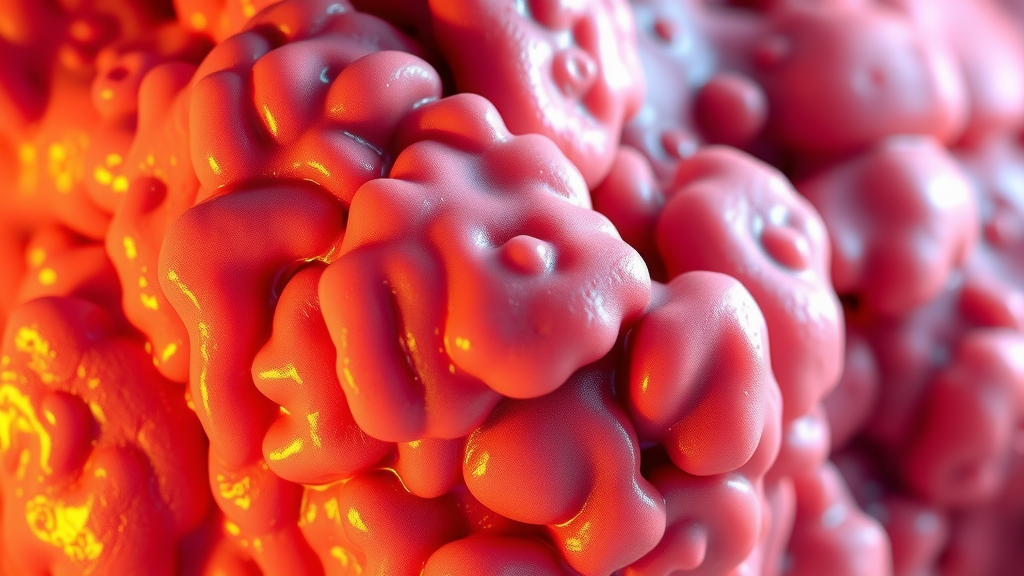
Chronic inflammation affects countless individuals, yet its underlying mechanisms often remain misunderstood. This prolonged inflammatory response can lead to serious health issues such as autoimmune diseases and cardiovascular disease.
Identifying effective strategies to manage symptoms enhances overall quality of life.
Simple lifestyle modifications like adopting an anti-inflammatory diet rich in omega-3 fatty acids, incorporating regular exercise, and practicing mindfulness techniques can significantly mitigate inflammation.
By embracing these changes, individuals can empower their immune system and foster a healthier, more vibrant existence.
‘Click here to learn more about:’ the ultimate anti inflammatory guide
Understanding Inflammatory Responses
The complex nature of the body’s inflammatory responses plays a significant role in health management. The inflammatory response serves a protective role, distinguishing between acute inflammation, a short-term reaction, and chronic inflammation, which can persist for months or years.
Acute inflammation occurs swiftly following an injury or infection, characterized by symptoms like redness and swelling, facilitating healing. Conversely, chronic inflammation may stem from unresolved acute responses, leading to sustained tissue damage.
This condition contributes to diseases such as arthritis and diabetes.
Key Mechanisms of Acute vs.
Chronic Inflammation
- Acute Inflammation: Typically resolves within days to weeks, promoting healing and recovery.
- Chronic Inflammation: Can last for months or years, often resulting from continuous exposure to inflammatory stimuli.
Recognizing these differences aids in addressing the root causes of chronic inflammation effectively.

Solutions for Managing Chronic Inflammation
Implementing specific strategies can significantly reduce symptoms associated with chronic inflammation:
- Anti-inflammatory Diet: Incorporate foods such as berries, fatty fish, nuts, and green leafy vegetables.
- Regular Exercise: Engage in moderate physical activity to reduce inflammation markers.
- Adequate Sleep: Prioritize restful sleep to help regulate immune function.
- Stress Management: Incorporate mindfulness practices, yoga, or meditation to reduce stress levels.
- Hydration: Drink plenty of water to maintain optimal bodily functions.
- Supplements: Consider omega-3 fatty acids, curcumin, or probiotics after consulting a healthcare provider.
- Avoiding Processed Foods: Reduce intake of sugary beverages, trans fats, and processed snacks.
- Regular Medical Check-ups: Monitor inflammatory markers through blood tests under a healthcare professional.
- Elimination Diets: Identify and remove food sensitivities, such as gluten or dairy.
- Home Remedies: Utilize herbs and spices with anti-inflammatory properties, like ginger and garlic.
General Information on Chronic Inflammation
- Chronic inflammation differs from acute inflammation, which is a necessary response to injury or infection.
- Symptoms of chronic inflammation include fatigue, joint pain, and digestive issues.
- Maintaining a healthy weight can benefit inflammation levels, as excess fat can produce inflammatory compounds.
- Incorporating antioxidants into the diet helps combat oxidative stress linked to chronic inflammation.
- Regular consultations with healthcare professionals tailor interventions specific to individual needs.
The Role Of Immune Cells
Immune cells serve as frontline defenders in the body’s inflammatory response. Among these, macrophages play a significant role by engulfing pathogens and clearing cellular debris.
They also secrete inflammatory cytokines that trigger further phases of the inflammatory process.
Neutrophils are the first responders to sites of infection, actively participating in acute inflammation.
In contrast, T cells and B cells are pivotal in adapting the immune reaction; T cells help regulate other immune cells, while B cells are responsible for producing specific antibodies tailored to target pathogens. When the regulation of these immune cells is disrupted, it can result in chronic inflammation, which is linked to various health conditions, including autoimmune disorders and chronic diseases.
Factors Leading To Inflammation
Multiple factors contribute to the development of inflammation within the body.
Environmental factors, such as pollution, have been shown to provoke inflammatory responses, especially affecting the respiratory system. Dietary choices also play a critical role; diets high in processed foods can elevate inflammation markers.
Lifestyle choices such as inadequate physical activity and persistent stress further exacerbate inflammation risk.
Genetic predispositions may also increase susceptibility to inflammatory responses in certain individuals.
- Environmental Influences: Pollution and exposure to toxins.
- Dietary Factors: Consumption of processed foods and sugars.
- Lifestyle Choices: Sedentary behavior and stress levels.
- Genetic Predispositions: Family history of autoimmune diseases.
Chronic Inflammation Solutions
Chronic inflammation is an ongoing inflammatory response that potentially leads to a variety of health issues, including autoimmune diseases and cardiovascular conditions. Addressing this involves a combination of lifestyle changes and dietary modifications, alongside potential medical interventions.
Key strategies for managing chronic inflammation include:
- Anti-inflammatory Diet: Including foods such as berries, fatty fish, nuts, and leafy greens.
- Regular Exercise: Engaging in moderate physical activity to lower inflammation markers.
- Adequate Sleep: Ensuring sufficient restful sleep to help support immune function.
- Stress Management: Practicing mindfulness, yoga, or meditation to mitigate stress levels.
- Hydration: Maintaining proper hydration for optimal bodily functions.
- Supplements: Considering options like omega-3 fatty acids or curcumin, preferably under guidance from a healthcare provider.
- Avoiding Processed Foods: Reducing intake of sugary beverages and unhealthy fats.
- Regular Medical Check-ups: Monitoring inflammatory markers through professional blood tests.
- Elimination Diets: Identifying and removing food sensitivities, such as gluten or dairy.
- Home Remedies: Utilizing herbs and spices noted for their anti-inflammatory properties, like ginger and garlic.
This holistic approach can lead to improved health outcomes and reduced inflammation symptoms, significantly enhancing overall wellness and recovery.
Inflammation and Immune Cells
- Research indicates that chronic inflammation is a key factor in the development of diseases such as diabetes and heart disease.
- Studies have shown that a diet rich in anti-inflammatory foods can significantly lower inflammation markers in the body.
- Regular physical activity has been linked to reduced levels of inflammatory cytokines, promoting a healthier immune response.
- Mindfulness and stress reduction techniques have been found to decrease inflammation and improve overall health outcomes.
Ways To Support Healing
Recovery from chronic inflammation can be significantly enhanced through various methods. One effective approach is alternative therapies.
Techniques such as acupuncture may promote healing by increasing blood flow and triggering endorphin release.
Additionally, massage therapy helps alleviate muscle tension, which can contribute to inflammatory responses.
Nutritional Support
Fermented foods like kimchi and yogurt are beneficial for gut health, directly influencing inflammation levels.
Incorporating herbs such as turmeric and boswellia into daily meals can provide strong anti-inflammatory properties. Consider the following dietary adjustments:
- Anti-inflammatory diet: Focus on foods like berries, fatty fish, nuts, and leafy greens.
- Avoid processed foods: Limit intake of sugary beverages and trans fats.
Holistic Techniques
Utilizing mind-body techniques such as biofeedback and tai chi can assist in managing stress, further supporting the healing process. Regular exercise is also vital; engaging in moderate physical activity has been shown to reduce inflammation markers. Prioritizing adequate sleep is essential for regulating the immune system.
Chronic Conditions And Their Impact
Chronic inflammatory conditions can lead to significant long-term health issues. These include serious diseases such as heart disease, diabetes, and various autoimmune disorders. Individuals experiencing chronic inflammation often face ongoing tissue damage and disruption in metabolic processes.
Mental Health Connection
Chronic inflammation is linked to mental health, with inflammatory cytokines potentially causing mood disorders such as depression and anxiety. Addressing these conditions through lifestyle adjustments can significantly improve overall health outcomes.
Management Strategies
Incorporating the following strategies can provide a comprehensive approach to managing chronic inflammation:
- Stress management: Implement mindfulness practices, yoga, or meditation to lower stress levels.
- Hydration: Drink sufficient water to maintain optimal bodily functions.
- Supplements: Evaluate omega-3 fatty acids, curcumin, or probiotics with a healthcare provider.
- Regular check-ups: Monitor inflammatory markers through blood tests.
Understanding the interconnectedness of lifestyle choices, nutrition, and overall wellness can lead to improved management of chronic inflammatory diseases, ultimately enhancing quality of life.
Chronic Inflammation
- Studies show that chronic inflammation is linked to a higher risk of developing heart disease and diabetes.
- Research indicates that an anti-inflammatory diet can significantly reduce inflammation markers in the body.
- Regular physical activity has been proven to lower levels of inflammatory cytokines.
- Mind-body techniques, such as yoga and meditation, have been shown to effectively reduce stress and improve overall health outcomes.
Exploring Inflammation And Disease
Chronic inflammation underpins various health conditions, yet its intricacies are often underestimated. Specific case studies illustrate how this prolonged immune response affects diseases such as rheumatoid arthritis, heart disease, and type 2 diabetes.
Unique findings identify elevated inflammatory cytokines, including TNF-alpha and CRP, as critical biomarkers for early diagnosis and targeted therapies.
In autoimmune diseases, inflammation exacerbates symptoms, demonstrating its role in exacerbation cycles.
Recognizing these mechanisms enhances knowledge of how chronic inflammation may lead to severe conditions, prompting proactive medical interventions.
Case Study: Rheumatoid Arthritis
Rheumatoid arthritis (RA) serves as a prime example of chronic inflammation’s role in autoimmune disease. Research shows that high levels of inflammatory cytokines in RA patients correlate with the severity of joint damage.
One study emphasized that specific cytokines not only indicate disease progression but also influence treatment efficacy.
Linking Inflammation to Heart Disease
Heart disease represents another significant consequence of chronic inflammation. Elevated markers of inflammation, such as C-reactive protein, have been associated with increased risk for cardiovascular disease.
This highlights the importance of monitoring inflammatory levels to prevent severe health complications.
Type 2 Diabetes and Inflammation
Recent investigations into type 2 diabetes reveal that chronic inflammation impacts insulin sensitivity.
Studies indicate that inflammatory cells infiltrate adipose tissue, leading to metabolic dysregulation.
Understanding these processes opens potential avenues for early intervention and management of diabetes.
The Connection Between Stress And Inflammation
The interplay between psychological stress and inflammatory processes is a significant area of research. Stress can activate the hypothalamic-pituitary-adrenal (HPA) axis, leading to cortisol release, which paradoxically exacerbates inflammation.
Chronic stress elevates pro-inflammatory cytokines, thereby perpetuating a cycle of inflammation.
Biological Pathways of Stress-Induced Inflammation
Research indicates that stress impacts immune function, promoting heightened inflammatory responses that may contribute to various health issues.
For instance, chronic stress has been associated with a greater prevalence of autoimmune disorders due to sustained inflammation.
Strategies for Mitigating Inflammation
To combat inflammation induced by stress, several solutions can be implemented:
– Anti-inflammatory Diet: Incorporating foods such as berries, fatty fish, nuts, and green leafy vegetables.
– Regular Exercise: Engaging in moderate physical activity reduces inflammation markers.
– Adequate Sleep: Prioritizing restful sleep helps regulate immune function.
– Stress Management: Mindfulness practices, yoga, or meditation can mitigate stress levels.
– Hydration: Drinking plenty of water supports optimal bodily functions.
– Supplements: Exploring options like omega-3 fatty acids, curcumin, or probiotics with guidance from a healthcare provider.
– Avoiding Processed Foods: Limiting sugary beverages, trans fats, and processed snacks is beneficial.
– Regular Medical Check-ups: Monitoring inflammatory markers through blood tests.
– Elimination Diets: Identifying and removing food sensitivities, such as gluten or dairy.
– Home Remedies: Utilizing herbs and spices with anti-inflammatory properties, like ginger and garlic.
Chronic inflammation differs from acute inflammation, which is a short-term and necessary response to injury or infection.
Chronic inflammation manifests as symptoms like fatigue, joint pain, and digestive issues.
Maintaining a healthy weight can benefit inflammation levels, as excess fat produces inflammatory compounds.
Incorporating antioxidants into the diet can help combat oxidative stress linked to chronic inflammation. Regular consultations with healthcare professionals can tailor interventions specific to individual needs.
Inflammation and Disease
- Chronic inflammation is linked to serious health conditions such as rheumatoid arthritis, heart disease, and type 2 diabetes.
- Elevated levels of inflammatory cytokines, like TNF-alpha and CRP, serve as important biomarkers for early diagnosis and treatment strategies.
- Psychological stress can activate inflammatory processes, leading to increased levels of pro-inflammatory cytokines.
- Implementing lifestyle changes, such as a balanced diet and regular exercise, can significantly reduce inflammation and improve overall health.
Anti Inflammatory Diet Choices
Making informed food choices can significantly impact the levels of chronic inflammation in the body. A well-rounded diet that emphasizes specific nutrient-rich foods can aid in reducing inflammation.
Berries stand out due to their abundance of antioxidants, which effectively combat inflammatory processes.
Similarly, fatty fish, particularly varieties such as salmon and mackerel, are rich in omega-3 fatty acids known for their anti-inflammatory properties.
Foods to Include
- Nuts and Seeds: These provide essential healthy fats and fiber, promoting a balanced inflammatory response.
- Green Leafy Vegetables: Options like spinach and kale are packed with vitamins and minerals that bolster overall health.
- Whole Grains: Incorporating whole grains such as oats and quinoa can decrease inflammatory markers in the body.
- Herbs and Spices: Turmeric and ginger possess notable anti-inflammatory properties, enhancing both flavor and health benefits in meals.
Emphasizing these food groups can contribute to a balanced anti-inflammatory diet that supports improved health and well-being.
The Importance Of Tissue Repair
Effective tissue repair is essential for recovery from injuries and inflammation influences each stage of this process. The initial phase begins with hemostasis, which stops bleeding through blood clotting. Following this, the inflammation stage plays a critical role. While inflammation is necessary for healing, excessive inflammation can delay recovery. This stage is characterized by increased blood flow and the activation of the immune system.
Stages of Tissue Repair
Proliferation: During this phase, new tissue formation occurs. Fibroblasts and endothelial cells work diligently to cover wounds, aiding in recovery.
Remodeling: This stage focuses on reorganizing collagen fibers, enhancing the strength and function of the newly formed tissue.
Throughout all these stages, effective management of inflammation is critical for optimizing the healing process.
Addressing chronic inflammation is paramount for individuals facing related symptoms. Various lifestyle changes and dietary adjustments can significantly alleviate these symptoms:
Solutions for Chronic Inflammation
- Anti-inflammatory Diet: Emphasize foods such as berries, fatty fish, nuts, and green leafy vegetables.
- Regular Exercise: Engage in moderate physical activity to help lower inflammation markers.
- Adequate Sleep: Prioritize restful sleep, supporting healthy immune function.
- Stress Management: Incorporate mindfulness practices, yoga, or meditation to mitigate stress levels.
- Hydration: Maintain optimal body functions by drinking adequate water.
- Supplements: Consult with a healthcare provider regarding omega-3 fatty acids, curcumin, or probiotics.
- Avoid Processed Foods: Reduce intake of sugary beverages, trans fats, and snacks that may contribute to inflammation.
- Regular Medical Check-ups: Monitor inflammatory markers through blood tests as advised by a healthcare professional.
- Elimination Diets: Identify and remove food sensitivities, such as gluten or dairy, that may escalate symptoms.
- Home Remedies: Utilize anti-inflammatory herbs and spices, such as ginger and garlic, in daily meals.
Incorporating these strategies can lead to meaningful improvements in health and a reduction in the symptoms of chronic inflammation.
Anti-Inflammatory Diet and Tissue Repair
- Studies show that diets rich in omega-3 fatty acids can reduce markers of inflammation in the body.
- Research indicates that regular consumption of berries can lower the risk of chronic diseases due to their high antioxidant content.
- Physical activity has been linked to lower levels of inflammatory cytokines, promoting overall health.
- Sleep deprivation has been associated with increased inflammation, highlighting the importance of adequate rest for recovery.
Managing Systemic Inflammation
Chronic inflammation can pose significant risks to overall health, highlighting the importance of effective management strategies. Recognizing biomarkers, such as High-Sensitivity C-Reactive Protein (hs-CRP) and Interleukin-6 (IL-6), is essential for assessing levels of inflammation.
Advanced techniques for monitoring include the use of wearable technology, which facilitates continuous tracking of physiological stress responses in real-time.
Integrating lifestyle modifications is paramount.
Some recommended adjustments include:.
- Anti-inflammatory Diet: Incorporate foods such as berries, fatty fish, nuts, and green leafy vegetables.
- Regular Exercise: Engage in moderate physical activity to reduce inflammation markers.
- Adequate Sleep: Prioritize restful sleep to help regulate the immune system.
- Stress Management: Utilize mindfulness practices, yoga, or meditation to alleviate stress levels.
- Hydration: Drink plenty of water to maintain optimal bodily functions.
Other potential solutions include:.
- Supplements: Consider omega-3 fatty acids, curcumin, or probiotics after consulting a healthcare provider.
- Avoiding Processed Foods: Reduce the intake of sugary beverages, trans fats, and processed snacks.
- Regular Medical Check-ups: Monitor inflammatory markers through blood tests under a healthcare professional’s guidance.
- Elimination Diets: Identify and remove food sensitivities, such as gluten or dairy.
- Home Remedies: Utilize anti-inflammatory herbs and spices such as ginger and garlic.
These strategies not only help reduce chronic inflammation but also enhance overall health. Implementing these lifestyle changes empowers individuals to combat chronic inflammation effectively.
Innovations In Inflammation Research
Groundbreaking discoveries are reshaping the study of inflammation, particularly concerning chronic diseases. Among these advances, gene editing technologies like CRISPR offer new avenues for effectively manipulating inflammatory responses. Artificial intelligence is increasingly employed to analyze extensive datasets, aiding in the prediction of inflammation-related diseases and refining personalized medical approaches.
Key advancements include:.
Emerging therapeutic strategies target inflammatory pathways with biologics showing significant potential in treating conditions like autoimmune diseases.
The exploration of the microbiome underscores the essential connection between gut health and systemic inflammation, paving the way for innovative treatment options. Significant insights include:.
- The microbiome’s role in regulating systemic inflammation could yield novel therapeutic landscapes.
- Ongoing research emphasizes the importance of lifestyle interventions in managing inflammatory responses.
- Technological advancements, such as wearable devices, enhance individual monitoring and tailored health strategies.
These innovations not only hold promise for improved treatment outcomes but also contribute to a deeper understanding of inflammation’s role in health and disease.
| Health Strategy | Benefits |
|---|---|
| Anti-inflammatory Diet | Reduces inflammation through nutrient-rich foods. |
| Regular Exercise | Lowers inflammation markers and improves overall health. |
| Gene Editing Technologies (CRISPR) | Offers new methods to manipulate inflammatory responses. |
| Microbiome Research | Explores the gut’s role in regulating systemic inflammation. |
Chronic Inflammation Kid 10 | Urgent Relief For Inflammatory Syndrome
Chronic Inflammation And Depression | Unique Remedies For Everyday Relief



